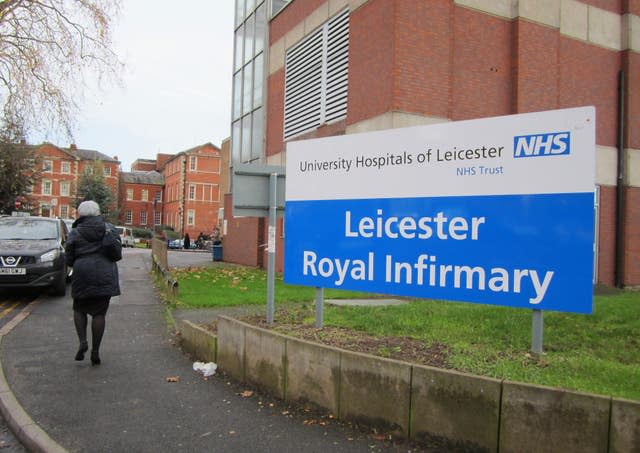Safety of maternity care at two NHS trust hospitals rated ‘inadequate’
The safety of maternity care at two sites run by a Midlands NHS trust has been rated as “inadequate” following a “deterioration in the level of care”, the health watchdog has said.
The Care Quality Commission (CQC) downgraded its rating of the safety of maternity care provided at Leicester Royal Infirmary (LRI) and Leicester General Hospital (LGH) following inspections in February and March.
In a report released on Wednesday, the CQC said it had been told by staff that they were being “pushed to the brink” due to low staffing levels, which risked the safety of mothers and babies.
The University Hospitals of Leicester NHS Trust, which runs the sites, said it took the findings of the report “incredibly seriously” and was already making improvements.
Carolyn Jenkinson, deputy director of secondary and specialist healthcare at the CQC, said: “When we inspected maternity services at University Hospitals of Leicester NHS Trust, we observed a deterioration in the level of care being provided to women, people using the service and their babies.
“The leadership team has recently restructured with many new posts still needing to be embedded.
“Leaders should continue to focus on improving their oversight of risks and managing performance so people can receive a better and safer standard of care.
“Both services were regularly understaffed, which placed people and their babies at risk.
“It also meant staff weren’t always able to take their breaks, which affected their wellbeing, morale, and ability to do their job.
“We also found multiple examples where people’s care had been delayed in maternity triage due to doctors not being available.
“Some of these delays were very long, for example, six hours, and some resulted in people self-discharging before they had a medical review, which could place them at risk.
“We will continue to monitor the trust, including through future inspections, to ensure the necessary improvements are made so people and their babies can receive safe and appropriate care.”

The trust’s three sites that provide maternity care were inspected as part of the CQC’s national maternity inspection programme.
All were inspected in the “safe” and “well-led” categories, two of multiple criteria that the CQC uses to inspect healthcare providers and form an overall rating.
St Mary’s Birth Centre’s “safe” rating remained as “good”, but its “well-led” rating was downgraded from “good” to “requires improvement”. The overall rating of the site, in Melton Mowbray, remains as “good”.
At LRI and LGH, the “safe” rating was downgraded from “requires improvement” to “inadequate”, and its well-led rating also went from “good” to “requires improvement”.
The rating for maternity care as a whole at the two sites has been downgraded from “good” to “requires improvement”.
The overall ratings for the two sites, and the trust, remain as “requires improvement”.
Following the inspection, the CQC issued a warning notice to the trust to ensure improvements are made.
In its report, the watchdog also raised concerns over risk assessments and medicine storage but said the trust was already working on addressing key risks, including staffing levels, with employees feeling they could approach the trust’s new leadership team to raise concerns.
The CQC also said that staff at St Mary’s Birth Centre “should be proud of the safe care they were providing”, and that staff were appropriately trained.
In an open letter published on Wednesday, the trust said that it had “already identified many of the challenges raised by the CQC” and improvements were being made after a new director of midwifery and clinical director were appointed earlier this year.
It said 24 midwives will join in November, following 25 who joined in January, and improvements had already been made in infection prevention and triage assessments but acknowledged that “there is much more to do”.
Julie Hogg, chief nurse at the trust, said in a statement: “Improving maternity services is a key priority and many of the highlighted challenges had already been identified before the inspection with plans in place to tackle them.
“However, we take the report and its findings incredibly seriously and are using them to drive further improvements for women and birthing people.
“We have invested in new equipment and daily safety checking and made rapid improvements to cleanliness and infection prevention practices.
“We are also progressing plans for a new maternity theatre at the Leicester General Hospital, meaning that planned and emergency caesareans will take place in separate areas.
“While we know there is more to do, we are committed to providing safe, high-quality and compassionate care and are encouraged that the reports highlight our hardworking staff and the actions being taken to ensure a culture of safety and openness.
“We have invited the CQC back to see the changes we have made and the positive impacts they are having on the safety and quality of our service.”

 Yahoo News
Yahoo News 
